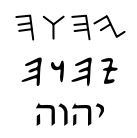יהוה
Hebrew

Etymology
The etymology of this theonym has been discussed very extensively in scholarly literature but remains uncertain. See the Wikipedia article on Yahweh for further discussion.
Pronunciation
- In the Biblical Hebrew of antiquity (before 400 BCE), the word was probably pronounced approximately /jahˈwe/.
Proper noun
יהוה • (YHVH) m
- The Tetragrammaton, one of the names of God.
- The proper, personal name of the Jewish God.
Usage notes
- The word is written in the Hebrew Bible either without vocalisation or as יְהֹוָה, using the vocalization of the word אֲדֹנָי (adonái, “my Lord”), because of the prohibition of uttering the name. It is thought that the original pronunciation was probably lost around the Hellenistic era. In some cases, when preceded by the word אֲדֹנָי (adonái, “my Lord”), it is written as יֱהֹוִה, using the vocalization of the word אֱלֹהִים (elohím, “God”).
- Secular Jews in Israel pronounce the word as אדוני \ אֲדֹנָי (adonái) usually, under most circumstances.
- Religious Jews pronounce it as אֲדֹנָי (adonái, “my Lord”) only for liturgical purposes, otherwise they use הַשֵּׁם (hashém, “the name”).
- Samaritans pronounce it as ࠔࠝࠌࠠࠀ (š'mā, “the name”) — from שְׁמָא (šəmā, “the name”), the Aramaic equivalent of הַשֵּׁם (hashém) — under all circumstances, even in liturgy.
See also
- אהיה
- יְיָ
- אֵל (él)
- אלוהים \ אֱלֹהִים (elohím)
- הַשֵּׁם (hashém)


References
- Brown, Francis; Driver, Samuel Rolles; Briggs, Charles Augustus (1906) A Hebrew and Aramaic Lexicon of the Old Testament, Oxford: Clarendon Press
This article is issued from
Wiktionary.
The text is licensed under Creative
Commons - Attribution - Sharealike.
Additional terms may apply for the media files.